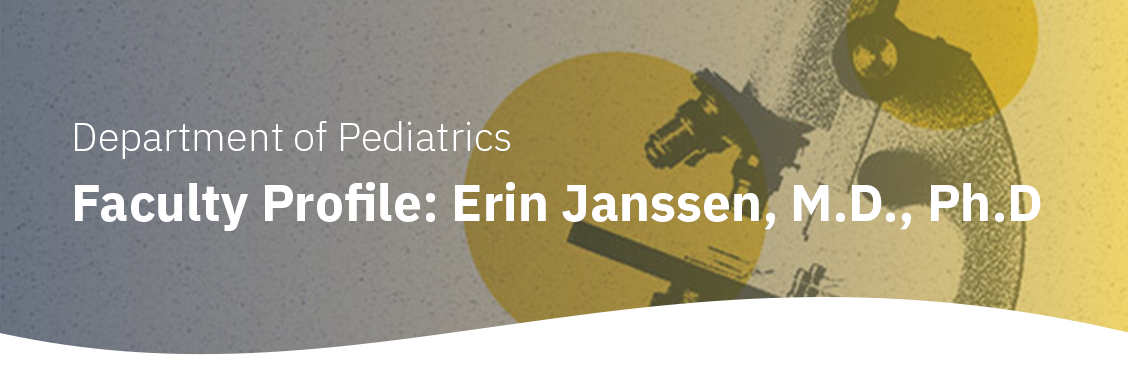

About Dr. Janssen
Dr. Janssen received her undergraduate degree from the Massachusetts Institute of Technology, followed by a Ph.D. and M.D. from Duke University. She has completed an internship, residency, clinical, and research fellowships at Boston Children’s Hospital. Most recently, she was an Assistant Professor of Pediatrics at Harvard Medical School. Dr. Janssen comes to the University of Michigan with an impressive history of awards and experiences. She is on the editorial boards for Clinical Immunology, Journal of Allergy and Clinical Immunology, and Frontiers in Immunology and has spoken at several national and international conferences. Janssen joined the department of pediatrics in October 2022.
You're currently serving as the Director of Rheumatology. Could you explain your role and what appealed to you about taking on this position?
I was drawn to this position because it would provide me with an opportunity to grow and shape the division. I’m able to give input into the direction of our three core areas; clinical, research, and education. Pediatric Rheumatology is a small field. I want to expand our reach as much as possible.
There was already a great group of core individuals here, along with some new people joining. This means new opportunities to both mentor and learn from individuals in the division.
Describe your day-to-day responsibilities as a director, and your vision for the department going forward.
I’ve only been here for 5 weeks, so my day-to-day right now changes a lot. So far, I’m getting to know the division and seeing how it works. I’m paying attention to our strengths and areas to improve upon. As I’m getting to know people, I see my job as providing those mentorship experiences and lending my professional experiences to others. I’m also caring for patients and starting my own lab.
Can you tell us more about your lab?
I’ve been doing research for years, but always within a larger group. Coming here, I’ve had to learn a new system from scratch. It’s been a challenge, but within the next few months, the basics of the lab should be in place and I can begin working on the fun things like forming collaborations and executing the research plan.
What goals do you have for each mission area?
Clinical: For the clinical mission, kids with rheumatic diseases don’t have enough doctors to go around. I’d like to decrease our patient's wait time and increase access. Early detection for these kids will improve their lives. We’re already extending quality care, but now we’ve had the growth to see substantially more patients.
A lot of pediatric rheumatology is not evidence-based, there just aren’t big studies. Having a diverse team here from different areas of the county has helped us create a forum and put our heads together to devise up the best treatments based on our experiences.
Research: We don’t know much about the underlying mechanisms of most of our diseases, so it’s important to get our faculty involved in research. An initial effort that’s started is creating a biobank. This will help to expand our registry and collect more information and bio samples from patients. Getting these samples is key to doing clinical and translational studies. Insights from these clinical studies can also point us in the right direction as we do more mechanistic studies in the lab.
Education: The fellowships have been highly successful in training pediatric rheumatologists. However, there are always ways to further to enhance the education for trainees (residents, fellows) as well as the continuing education for staff. For instance, we are working on obtaining an ultrasound machine, it will benefit patients to have it readily available in the clinic but also provides our doctors with an opportunity to be trained and work with the newest technology expected of them. I also want to continue to strengthen our ties with the adult rheumatology division and continue the traditional of training internal medicine and pediatrics joint rheumatology fellows.
Are there new programs or research you would like to implement?
Expanding the clinical registry and biobank, which will form the foundation for projects that fellows and junior faculty members can do will benefit the entire division.
My model for research is to take an interesting disease in the clinic and find the best way to study it using patient samples and mice in the lab, so we can understand the molecular and cellular mechanisms leading to disease in patients.
What else should we know about you?
For my clinical practice and research - I like to solve puzzles. I enjoy collaborating with other physicians and seeing their difficult to diagnose and treat patients. I don’t specialize in one disease like arthritis or lupus, but I am most interested in the cases of complex autoimmunity or autoimmunity associated with immunodeficiency or allergic diseases. In addition, one of the best aspects of this job is seeing my patients grow over time. I’ve had patients that I’ve taken care of for more than a decade. It’s gratifying to see patients you’ve met as small children get their first job or go off to college. Having a long-term relationship with my patients in particularly rewarding.
In your opinion, what makes this an ideal place to work?
Since joining in October, I’ve found everyone in the department to be welcoming and collaborative. I was excited to come here because leadership is forward-thinking and supportive of my research goals.
What do you like to do outside of work?
I have a four-year-old daughter, and she keeps me quite busy. I love playing with her and watching her grow. I enjoy cooking and baking and would call myself a foodie. I like exploring Ann Arbor and checking out all the food options, my current quick favorite on the way home is Frita Batidos!



